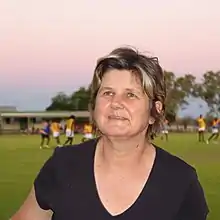Jane Balme
Jane Balme FAHA is a Professor of Archaeology at the University of Western Australia. She is an expert on early Indigenous groups and Australian archaeology.
Jane Balme | |
|---|---|
 | |
| Education | University of Western Australia Australian National University |
| Occupation | Archaeologist |
| Employer | University of Western Australia |
| Title | Professor |
Biography
Balme studied for an undergraduate degree in Anthropology at the University of Western Australia, graduating in 1979.[1] Balme worked on cave sites in south west Australia for the Western Australian Museum and became interested in archaeology.[2]
Balme completed her PhD at the Australian National University in 1990.[1]
Her research focuses on early Indigenous groups in Australia, gendered social organisation, and the discipline of archaeology.[1]
Balme has authored a wide range of journal articles, a textbook Archaeology in Practice: A Student Guide to Archaeological Analyses with Alistair Paterson, and the edited volumes Gendered Archaeology with Wendy Beck, and More Unconsidered Trifles : Papers to Celebrate the Career of Sandra Bowdler.[3] A review of Archaeology in Practice states that "It is rare that a book is written as a text book but also provides an important contribution to the discipline and this volume deserves this dual recognition."[4]
Balme has been strongly involved with the Australian Archaeological Association, serving as secretary and chair of the Australian National Committee for Archaeology Teaching and Learning.[1]
In November 2018 Balme was elected Fellow of the Australian Academy of the Humanities.[5]
As of 2020 Balme, working alongside Sue O'Connor, is researching Rock art in Australia with a particular focus on carvings (also called dendroglyphs) on Boab trees in the Kimberley Region and in the Tanami Desert.[6] In this study the pair discuss the history of research into this trees as well as present a recent survey; in the Kimberley they worked closely with Nyigina and Mangala Traditional Owners.[7] Their results provide insight into the archaeological and anthropological significance of these carvings.[8]
Selected publications
- K. Frederick, U., Balme, J., Jamieson, J. et al. Embedded in the Bark: Kimberley Boab Trees as Sites of Historical Archaeology. Int J Histor Archaeol 27, 817–840 (2023). https://doi.org/10.1007/s10761-022-00678-z
- O'Connor, S., Balme, J., Frederick, U., Garstone, B., Bedford, R., Bedford, J., . . . Lewis, D. (2022). Art in the bark: Indigenous carved boab trees (Adansonia gregorii) in north-west Australia. Antiquity, 96 (390), 1574-1591. doi:10.15184/aqy.2022.129
- Balme, J., O’Connor, S. & Fallon, S. 2018. New dates on dingo bones from Madura Cave provide oldest firm evidence for arrival of the species in Australia. Scientific Reports. 8, 1, 9933
- Balme, J. and O'Connor, S. 2016. Dingoes and Aboriginal social organisation in Holocene Australia. Journal of Archaeological Science: Reports 7: 775–781.
- Balme, J. and O'Connor, S. 2015. A 'port scene', identity and rock art of the inland Southern Kimberley, Western Australia. Rock Art Research 32 (1): 75–83.
- Balme, J. and Paterson, A. 2014. Archaeology in Practice.
- Balme, J. 2013. Of boats and string: the maritime colonisation of Australia. Quaternary International 285: 68–75.
- Bowdler, S. and Balme, J. 2010. Gatherers and grannies: further thoughts on the origins of gender. Australian Feminist Studies 25: 391–405.
- Balme, J., Davidson, I., Mcdonald, J., Stern, N., Veth, P. Symbolic behaviour and the peopling of the southern arc route to Australia. Quaternary International 202 (1/2): 59–68.
- Balme, J. and Bulbeck, C. Engendering Origins : Theories of Gender in Sociology and Archaeology. Australian Archaeology 67: 3–11.
- Balme, J., O'Connor, S., Ulm, S., Ross, A. 2008. More Unconsidered Trifles: Papers to Celebrate the Career of Sandra Bowdler. Australian Archaeological Association Inc.[3]
- Balme, J. & Beck, W. 2002. Starch and Charcoal: Useful Measures of Activity Areas in Archaeological Rockshelters. Journal of Archaeological Science 29 (2): 157–166.
- Balme, J. & Toussaint, S. 1999. 'I reckon they should keep that hut': reflections on Aboriginal tracking in the Kimberley. Australian Aboriginal Studies 1: 26–32.
- Balme, J. & Beck, W. 1996. Earth mounds in southeastern Australia. Australian Archaeology 42: 39–51.
References
- Arthure, Susan (2014). "Balme, Jane". Encyclopedia of Global Archaeology. Springer. pp. 740–741.
- "Jane Balme – the UWA Profiles and Research Repository". research-repository.uwa.edu.au. Retrieved 17 August 2018.
- Balme, Jane; O'Connor, S.; Ulm, S.; Ross, A. (2008). More Unconsidered Trifles: Papers to Celebrate the Career of Sandra Bowdler. Australian Archaeological Association. ISBN 9780958922135.
- Ross, A (2006). "Review of 'Archaeology in Practice: A Student Guide to Archaeological Analyses' edited by Jane Balme and Alistair Paterson". Australian Archaeology. 62: 57–58.
- "Welcoming our 28 newly elected Fellows – Australian Academy of the Humanities". www.humanities.org.au. Retrieved 20 November 2018.
- Garstone, Brenda; Balme, Jane; O'Connor, Sue (11 October 2022). "The boab trees of the remote Tanami desert are carved with centuries of Indigenous history – and they're under threat". The Conversation. Retrieved 9 October 2023.
- K. Frederick, Ursula; Balme, Jane; Jamieson, Jeffrey; Marshall, Melissa; O’Connor, Sue (1 September 2023). "Embedded in the Bark: Kimberley Boab Trees as Sites of Historical Archaeology". International Journal of Historical Archaeology. 27 (3): 817–840. doi:10.1007/s10761-022-00678-z. ISSN 1573-7748.
- O'Connor, Sue; Balme, Jane; Frederick, Ursula; Garstone, Brenda; Bedford, Rhys; Bedford, Jodie; Rivers, Anne; Bedford, Angeline; Lewis, Darrell (December 2022). "Art in the bark: Indigenous carved boab trees (Adansonia gregorii) in north-west Australia". Antiquity. 96 (390): 1574–1591. doi:10.15184/aqy.2022.129. ISSN 0003-598X.